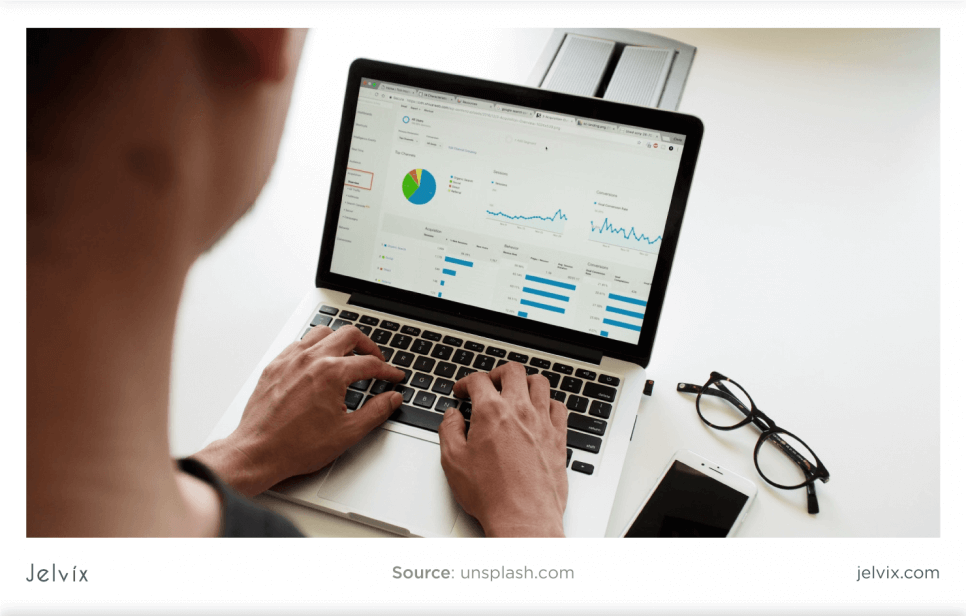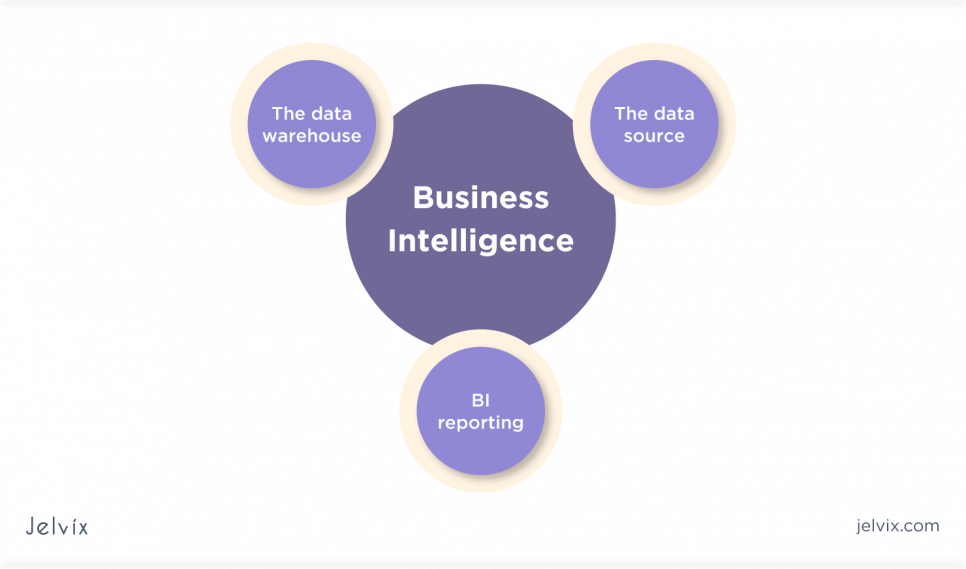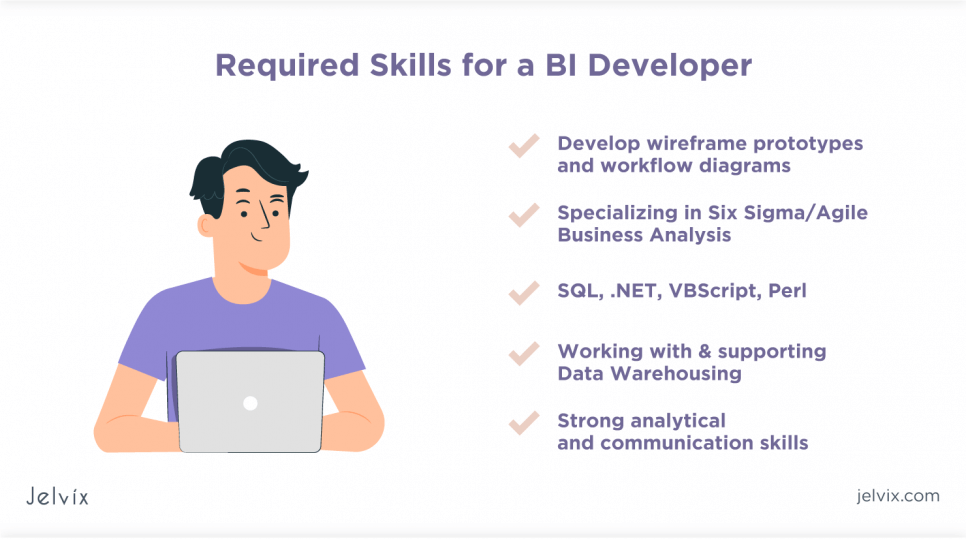In the modern, fast-changing world, companies are generating larger amounts of information than ever before. The data has become the lifeblood that drives the growth and success of any business. From the statistics about the performance of marketing campaigns and sales to keeping track of every interaction with current or potential clients – all this information and even more is gathered and multiplied daily.
All this data reflects the past and the current state of affairs in the company. However, if it’s processed and analyzed properly, it may also help unveil the upcoming trends and outline effective business strategies for the future. And this is where business intelligence (BI) comes into play.
Business intelligence transforms complex, scattered bits of information into understandable, easy-to-comprehend, and actionable insights. As a result, it helps companies make data-driven decisions and strategize more efficiently.
With the growing tendency for digitalization, business intelligence tools have gained even more popularity over recent years. According to the Statics MRC’s report, the global business intelligence market is predicted to reach $44.16 billion by 2027 from $21.06 billion in 2019, growing at a CAGR of 9.7% during the mentioned period.
Increased investments in analytics, constantly growing volumes of generated business data, and a rising need for data visualization create a greater demand for business intelligence applications and, as a result, BI developers.
This article takes a closer look at all the ins and outs of the business intelligence software engineer career. It also defines the roles, responsibilities, and skills required to become an experienced specialist in the BI domain.
What is business intelligence?
Business Intelligence (BI) is a complex of technologies, processes, and software tools utilized to gather, process, analyze and present business data. The primary aim of business intelligence initiatives is to aid companies in making data-driven business decisions, improving operational efficiency, and gaining a competitive edge over rival companies.
As a rule, BI represents a perfect amalgam of analytics, reporting, and data management instruments that are aimed at translating the collected information into valuable business insights. These insights can be further used to optimize business processes, speed up decision-making, identify rising market trends, spot weaknesses in business processes, and increase sales.
Business intelligence is a complicated concept that encompasses three main components:
- The data source is a fundamental component of any BI system. It is a place (for example, a database, cloud storage, or Excel file) where raw, unstructured data is stored. As a rule, data sources are linked to other data integration systems, storage, and the interface of the BI system.
- The data warehouse is a component aimed at the standardization and transformation of data to create a single database that will allow accessing all information in one place.
It encompasses unified storage and the tools used for Extraction, Transformation, and Loading (ETL). Typically, data warehousing systems are created and maintained by database/ETL developers and data analysts.
- BI reporting is the ultimate component that is focused on data visualization via the business intelligence UI. At this point, the data is pulled from the warehouse, analyzed, and represented in an easy-to-comprehend way.
All constituents of business intelligence reporting are the primary duty of the business intelligence software engineers. They build, maintain, and plan every aspect of the business intelligence interface.
As now you probably understand what business intelligence is, let’s take a closer look at the business intelligence developer job description and see how different it is from the BI analyst’s job.
Let's find out how Enterprise Data Warehouse can help solve big data challenges.
What is a BI developer?
A business intelligence (BI) developer is responsible for building, improving, and maintaining business intelligence tools, the primary goal of which is to transform data into valuable insights. These insights can be further studied and used in making important business decisions.
Simply put, BI data engineers make the data understandable and present it in the form which allows to easily interpret reports and graphs for the people who run organizations. These professionals deal with all aspects of the company. They are experienced developers with a keen business sense and are good at bridging gaps between processes and systems.
Since business intelligence specialists present the data to stakeholders and develop the BI software, they are expected to have an excellent understanding of coding, testing, troubleshooting, and designing new platforms.
In addition, the experience with different databases and instruments used for data modeling, data visualization, and interactive dashboards is also of high importance.
The expected salary of a BI engineer
Due to the rapid development of data science and the high potential of data to drive business decisions, the demand for specialists in the BI domain is constantly rising. As a result, the jobs related to business intelligence development are highly rewarding and will remain among the top needed skills in the near future.
In general, the salary of power BI developers depends on their technical background, skills, and experience. However, according to the data presented by Glassdoor, the average base pay of a BI data engineer in the US constitutes $103,581 per year, with $80,000 at the low end of the range and $135,000 at the high end. All of this makes them one of the most highly-paid professionals in the technology sector.
The difference between BI analyst vs BI developer
As more and more organizations are seeking ways to derive maximum value from their data, the spectrum of business intelligence jobs is expanding. BI analysts and BI developers are among the two most sought-after positions, whose job duties and responsibilities overlap in some areas. Yet, in fact, these business intelligence roles are quite distinct.
Let’s compare the business intelligence analyst job description to that of a BI developer.
A business intelligence analyst is a person that deals with data analysis using information collected throughout an organization and stored in a centralized database or data warehouse. The major goal of a BI analyst is to discover business-focused, actionable insights that will help to make the right business decisions using the BI tools.
On the other hand, a business intelligence developer is essentially a tech-savvy software engineer responsible for the creation, improvement, and maintenance of BI solutions. These solutions are further used by BI analysts to transform the data into analytical insights that are represented in easily digestible dashboards.
Key roles & responsibilities of business intelligence engineers
The role and responsibilities of a business intelligence developer will vary depending on the type and size of the business and the industry it belongs to. Yet, in most cases, the job typically involves the following duties:
-
Defining requirements for business intelligence solutions
The requirements for a business intelligence solution will vary from industry to industry and even from company to company. BI data engineers determine the types of data to be analyzed, the reporting techniques that will be used, and the form for the presentation of the result to the end-users.
-
Transforming business requirements into technical demands
When business requirements are clearly outlined, business intelligence engineers translate them into the technical demands that define the reporting capabilities and user interface peculiarities of the future BI platform. At this point, BI specialists determine the type of data visualizations and how end-users will interact with them.
-
Development, deployment, and maintenance of the BI solution
BI specialists play a central role in the development of business intelligence platforms. They take an active part in performing the actual development of the tasks, testing, and bug fixing in the pre-launch and post-launch stages.
Apart from that, senior experts may also take up positions of director of business intelligence and oversee the whole development process.
-
Contributing to the data warehouse development
Data warehouses create centralized storage for business information that comes from various sources. Together with the ELT development team, business intelligence specialists often actively participate in developing data warehousing systems, despite their architecture not influencing data visualization.
-
Writing user guides and documentation
Without well-drafted technical documentation, the end-users of a BI solution will not know how to use it in a proper way. Therefore, BI developers are often in charge of writing user guides and documentation that cover the most widely asked questions of regular users and aid technical staff in troubleshooting common issues.
Skills required to become a BI developer
As a rule, the position of a BI software developer requires a perfect mix of technical and business knowledge. From a technical standpoint, these professionals need to have strong coding skills and extensive knowledge of databases and data warehouses.
At the same time, in order to produce effective reporting systems, they should possess strong business acumen and a deep understanding of the specific industry and business processes. Since each BI project requires a different set of skills, we are going to outline the full list of skills that a potential candidate for a BI developer position might need.
Among the must-have hard skills for BI specialists are the following:
-
Knowledge of business intelligence tools
It goes without saying that every business intelligence software engineer should possess an in-depth understanding of how to use and configure the existing BI platforms and how to build custom products. The most commonly used BI platforms include such solutions as QuickSight, Power BI, Apache Superset, and Hadoop.
-
Strong software development skills
In order to build an efficient business intelligence solution, a business intelligence developer needs to have extensive experience with various programming languages. These days, employers are constantly looking for candidates that are well-versed in Python, JavaScript, TypeScript, or C#.
Aside from that, the excellent BI data engineer can also boast a profound understanding of data visualization libraries (D3.js, Matplotlib, and RGL), data formatting, warehouse architecture, and data integration tools.
-
Experience with databases
Building a functional BI interface is impossible without a solid understanding of databases, data models, and SQL/non-SQL queries. BI engineers use this knowledge to perform SQL queries and design BI reports and tools, including data models and dimensional analyses.
-
Business analysis skills
To properly define the requirements for a custom business intelligence solution, a BI data engineer needs to know how to analyze business data correctly.
-
Debugging & troubleshooting skills
Troubleshooting and debugging skills are a vital part of any software development process, and designing business intelligence tools is no exception. The main goal of business intelligence specialists is to deliver a stable and bug-free solution that represents business data properly.
Therefore, the ability to find and fix issues quickly is of extreme importance for the candidates in the BI domain.
Apart from hard skills, business intelligence data engineers also require a set of soft skills, including:
-
Communication skills
In most cases, the position of the SQL BI developer presupposes the need to communicate regularly with business clients, technical and operational staff. Therefore, the candidates looking for a job in this field should have excellent communication skills, be able to handle group presentations, present reports and graphical data to clients, and pitch business proposals.
-
Problem-solving skills
To build a truly efficient BI tool for a company, a BI engineer has to define its business problems correctly. In addition, these experts should be able to find out what causes these issues and offer clear solutions that will help the business to get rid of the problem areas.
-
Attention to detail
Detail orientation is another key skill of proficient business intelligence developers. This skill allows them to notice upcoming market trends in the business data and ensures the accuracy of the developed BI solution.
-
Team collaboration
Typically, business intelligence data engineers work in a team with other data engineers. They also need to cooperate closely with end-users who may lack a technical background. Therefore, becoming a great team player and building lasting relationships at the workplace would become a huge advantage for any data specialist.
How to start a career as a business intelligence software engineer?
As with any other career path, the business intelligence roles require their unit set of experiences, knowledge, and skills. If you are interested in becoming an expert in BI development, here is the list of useful recommendations that are worth considering:
-
Pursue a degree
As a rule, when looking for a BI data engineer, most employers pay attention to the candidate’s educational background. Getting a degree in computer science, software development, information technology, mathematics, or any other related field will help to get the BI position faster.
In addition, business intelligence roles and responsibilities may require some previous career experience in the role of data analyst or SQL developer.
-
Acquire necessary skills
To become a proficient business intelligence software engineer, a candidate needs to have a wide range of technical and business skills, as well as a number of personal qualities. Therefore, getting familiar with scripting languages, common BI solutions, data modeling techniques, and acquiring the necessary interpersonal skills will definitely enhance your chances of getting a job as a business intelligence specialist.
-
Start small
Since BI data engineers are usually in charge of the whole development cycle of a business intelligence platform, they must have an extensive software engineering background. With that in mind, future business intelligence experts might need to gain some experience in entry-level positions before starting a career in the business intelligence domain.
The experience in the roles of a data analyst, BI project manager, or junior software developer may help you to stand out in the crowd and gain the position of head of business intelligence in the future.
-
Don’t stop learning
In the contemporary context, technologies and business tools are evolving lightning fast. In order to remain a competitive candidate in the job market, BI professionals have to continuously learn, attend courses and be abreast of the newest technologies and trends in BI development.
Final Thoughts
Business intelligence has gained immense popularity in recent years. It encompasses a broad spectrum of tools and techniques that allow companies to refine their data, derive actionable insights into the market trends, and gain a competitive advantage over business rivals.
Thanks to the benefits of business intelligence platforms, the BI job market is also actively expanding along with the number of companies looking for BI specialists. Today, hiring a BI developer means adopting a data-driven approach to running your business.
The in-house business intelligence specialists are responsible for designing, managing, and implementing business intelligence solutions into the company’s workflows. These solutions allow organizations to visualize data, better understand their business needs, and eventually increase profits.
Yet, employing the whole BI team is quite an expensive affair. It is reflected in the average salary range of the business intelligence developer alone. This is where a reliable outsourcing company can save you a lot of time and money. Jelvix’s team of experienced software engineers can help implement a business intelligence solution into your business reality.
Feel free to contact us and receive a free consultation with our experts, who are looking forward to answering all of your questions about BI development.
Need a qualified team?
Leverage the top skills and resources to scale your team capacity.

















